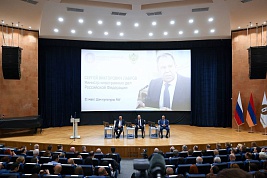Foreign Ministry Spokeswoman Maria Zakharova’s answer to a media question about a statement by US State Department Spokesperson Matthew Miller on the situation involving the Anglo-American School in Moscow
Question: How would you comment on the statement by the US State Department Spokesperson that the Anglo-American School was allegedly forced to close due to pressure from the Russian authorities?
MariaZakharova: The question of the status of the Anglo-American School (AAS) has a long history. The case in point is not an ordinary Embassy school, which educates only the children of its staff, but the fact that since the early 1990s, Washington has been trying to extend diplomatic status to an essentially commercial educational structure under the name of the AAS, which, unlike the American diplomatic mission school that had been functioning since 1949, accepted children of Russian citizens and expats, as well as those of diplomats from third countries, for a fee.
As a result, the AAS functioned in a legal vacuum, ignoring the demands of the Russian side (which refrained from taking drastic steps), to legalise the educational institution either as an ordinary embassy school, eliminating the commercial component and the training of Russian children, or as an autonomous non-profit organisation (ANO) that provides educational services in strict conformity with Russian laws.
When the Americans opted for ANO to legalise tuition fees and the possibility of recruiting students regardless of whether their parents had the diplomatic status, the Russian side was helpful in resolving organisational problems, including visa requirements for the teaching staff.
However, after the re-launch of the AAS in its new status in May 2021, the school authorities and the school’s supervisors in the person of the US, UK and Canadian embassies, continued to insist on the “unique nature” of the institution, thereby justifying their non-compliance with Russian laws, primarily in terms of licensing the educational activities.
Moreover, they used American curricula, including those promoting non-traditional values, which were deliberately imposed on underage Russian citizens in violation of Russian laws. At the same time, the AAS chose not to bring the teaching process in line with the relevant requirements, and after the Tushinsky District Court suspended the school for 90 days in March of this year to let them eliminate violations, the school authorities simply announced that it was closing down.
In light of the above, it is obvious that the State Department is clearly distorting the facts, accusing the Russian authorities of creating obstacles to children receiving an “excellent” and “sound,” as understood by the Americans, education. The recognition of the AAS in its present form as a “foreign agent,” which is particularly emphasised in America, merely reflects the actual state of affairs resulting from its registration as an “autonomous non-profit organisation,” but does not entail any prohibition at all. The true reason lies elsewhere. It is that the US is unwilling to follow Russian laws, which deprives Washington of the tools to influence the rising generations in Russia and to instill false values and guidelines.
